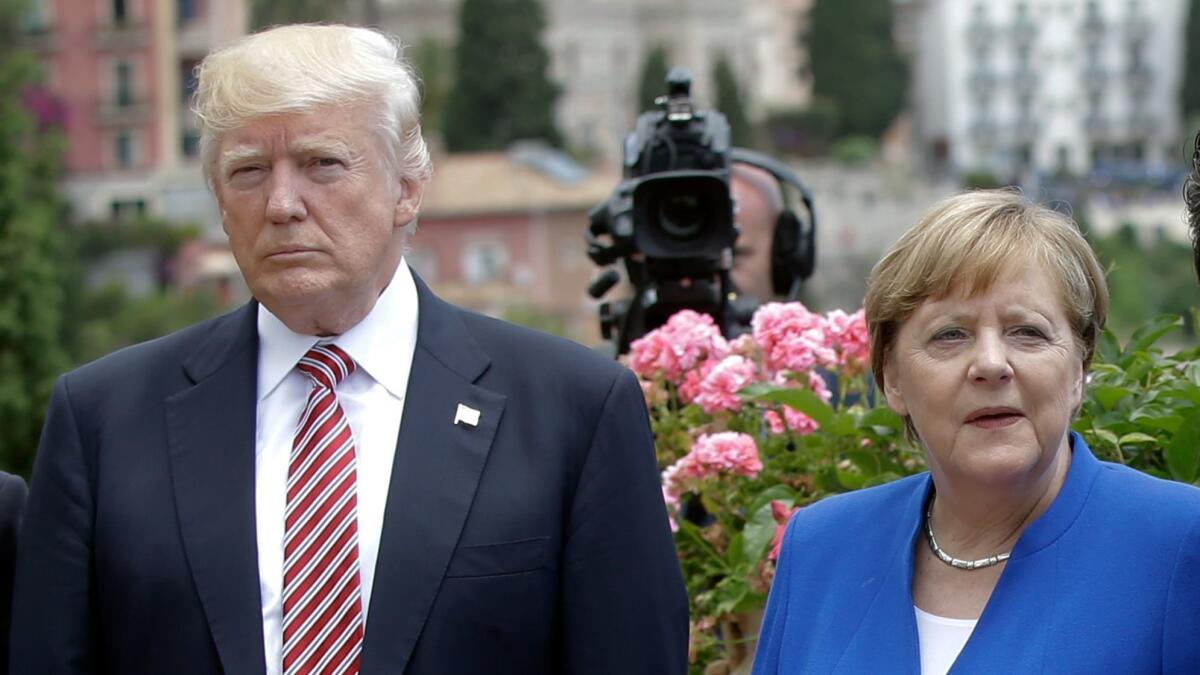Newsletter: Europe loves America, but not Trump

- Share via
Good morning. I’m Paul Thornton, and it is Saturday, July 8, 2017. No, it isn’t your imagination — it really is unbearably hot. Let’s take a look back at the week in Opinion.
Our columnist
The takeaway? For all their past griping over an overreaching, militaristic foreign policy and Americans’ lack of sophistication, Europeans saw the United States as a guarantor of the fragile world order that allowed a continent of formerly warring nations to prosper. With Trump in power now, there is concern we may no longer be on Europe’s side:
Brits, Italians and Germans all asked whether Trump’s presidency would be over by the end of the year. I described the complexities of impeachment, and how unlikely it was that a Republican-controlled Congress would go there. I reminded them of Italy’s Silvio Berlusconi, who won three elections and governed for nine years despite prosecutors’ efforts to bring him down.
Our European friends’ absorption in all things Trump goes beyond mere gossip, of course. They have gnawing concerns about an increasingly disorderly world — one in which the president of the United States, instead of bolstering stability, often seems to be a disruptor.
It wasn’t a scientific sample by any stretch. But our conversations mirrored a Pew global survey released last week which found that Trump is unpopular across much of the world and that his unpredictability has shaken confidence in the United States.
For half a century, Europeans got used to thinking of the United States as a stable cornerstone of world politics — not always sophisticated in their eyes, not always right, but reliably there. Now that we’re less reliable, they’re more nervous. “If the United States is making the world less stable instead of more stable, we’re all in deep ….,” Lala’s husband Carlo said in fluent American.
They know all too well that Europe — politically divided, militarily weak and economically listless — can’t fill the empty role of the missing superpower.
“Europe could be strong if countries knew how to work together, but they don’t,” said Peter, a German yoga instructor. “Nationalism gets in the way.”
Trump may have had one positive effect on continental politics, as Europe’s wave of nationalist populism appears to have ebbed. Trump-style anti-immigrant populists lost ground in three major elections this year: the Netherlands in March, France in May and Britain in June. In France, Trump virtually endorsed populist candidate Marine LePen; she was trounced by the
Obama -style Emmanuel Macron.“We have learned from your example,” Liliane joked.
There may be a silver lining for Americans too. Europeans who once resented our superpower status now express sympathy for our troubles — even nostalgia for American leadership.
Many Europeans condemned George W. Bush for invading Iraq. Then they pouted when Barack Obama, whom they liked better, made it clear he was more interested in Asia. Now they see a president who thinks alliances are a scam and doesn’t put much stock in the U.S. treaty commitment to defend Europe.
Trump wouldn’t like what Chief Justice John Roberts told graduating students. For a Fourth of July corrective to Trump’s juvenile Twitter feed, editorial writer Michael McGough encourages you to read or listen to a commencement speech delivered by Roberts, in which he imparted this valuable wisdom to new graduates: Don’t act like you deserve your privilege, and don’t celebrate the failure of others. In other words: Do not be like Donald Trump. L.A. Times
Is Trump mentally fit to serve? Three weeks ago on The Times’ op-ed page, Dr. Prudence L. Gourguechon — a physician, psychiatrist and psychoanalyst — evaluated the president’s leadership style and ability using the rubric provided in the U.S. Army’s “Field Manual 6-22 Leader Development.” (Spoiler alert: It doesn’t look good for Trump.) This week, Gourguechon explained her view of Trump’s mental fitness in an interview with MSNBC host Lawrence O’Donnell. MSNBC
Don’t rush to attack North Korea, Mr. President. North Korea reportedly conducted a successful test this week of a long-range ballistic missile, an ominous development that indicates the isolated dictatorship is steadily making progress toward being capable of striking the U.S. Tempting as preemptively striking North Korea and ending the nuclear threat might be, Trump must realize that any significant military action will probably result in the deaths of thousands of people, warns The Times Editorial Board. L.A. Times
L.A. County Supervisor
Amelia Earhart vanished 80 years ago this week, and we’ve never stopped looking for her. A recently unearthed photograph purporting to show the trailblazing American aviator along with her navigator is probably not proof that the two survived, at least for a short time, following their disappearance in 1937 during an attempt to circumnavigate the world by airplane. Whatever happened to her, Earhart deserves to be remembered for her accomplishments more than her mysterious death. L.A. Times
Reach me: paul.thornton@latimes.com
Sign up for Essential California
The most important California stories and recommendations in your inbox every morning.
You may occasionally receive promotional content from the Los Angeles Times.








